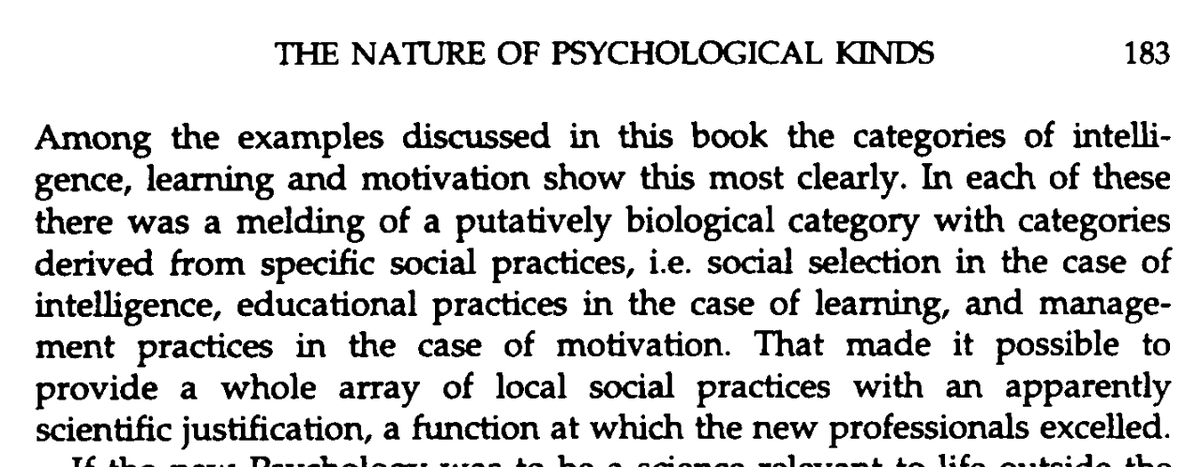This paper was actually incredibly important for me in inspiring certain thoughts in my dissertation. In short, when psychologists work on motivation, we need to be incredibly conscious of the historical and cultural contingencies of our work.
THREAD https://twitter.com/as_a_worker/status/1317743859292659712">https://twitter.com/as_a_work...
THREAD https://twitter.com/as_a_worker/status/1317743859292659712">https://twitter.com/as_a_work...
My dissertation is mostly about understanding motivation as a cognitive capacity: how do people allocate time to satisfy their needs/values/goals?
I take a computational perspective using scheduling theory: people assign priority (therefore time) to goals which satisfy needs.
I take a computational perspective using scheduling theory: people assign priority (therefore time) to goals which satisfy needs.
The problem people solve here requires inferring the priority of activities (goals) that satisfy basic needs.
This is a hard inference problem! p(need satisfied | time on activity = t) is VERY non-trivial, and dynamically changes!
This is a hard inference problem! p(need satisfied | time on activity = t) is VERY non-trivial, and dynamically changes!
In short, it& #39;s hard to invert the chain.
Time on activity -> satisfies goal(s) -> satisfies need(s) -> need is important to satisfy.
With uncertainty at each step.
Time on activity -> satisfies goal(s) -> satisfies need(s) -> need is important to satisfy.
With uncertainty at each step.
We integrate lots of information: can a goal be satisfied? If finished, can the goal satisfy the need? Is the need important? What are the alternatives?
This inference is likely approximate, and our brain combines different policies, information, and heuristics.
This inference is likely approximate, and our brain combines different policies, information, and heuristics.
Getting back to time use, society and culture provide constraints and signals to impact our time use.
This means our "motivation" (both priorities and needs) is heavily based on identity, context, class, etc (as well as physiology, e.g., hunger).
This means our "motivation" (both priorities and needs) is heavily based on identity, context, class, etc (as well as physiology, e.g., hunger).
Capitalism requires control over our time, to maximize profit. To get us to work on things we might not otherwise care about, it has to convince us, convince our brains, that the bullshit jobs we do satisfy our needs.
And this happens at every step of the inference.
And this happens at every step of the inference.
"Self-help" books mostly work by collapsing the uncertainty.
Here are your needs and values, here are the goals that satisfy them, here& #39;s how to achieve them - trust us because we have credibility derived from financial success, religious knowledge, OR psychological science.
Here are your needs and values, here are the goals that satisfy them, here& #39;s how to achieve them - trust us because we have credibility derived from financial success, religious knowledge, OR psychological science.
A lot of self-help written relies on psych or neuroscience for credibility, but the advice is mostly drawn from the same mix of practical therapy, ethics, and organizing tips. It& #39;s all maybe sorta useful in specific contexts for specific people.
As covered in Naming the Mind by Kurt Danziger, psychologists had to both justify their relevance AND credibility, and most of their concepts had to straddle that divide as well. Motivation is one example of this.
This was a fundamental struggle for me in my graduate career, as there seemed to be no way to integrate the dumb pile of motivation research. Focusing on "time allocation" as a capacity, and realizing the historical contingency of the rest, helped with that.
Also, as someone who has struggled with depression, ADHD symptoms, and anxiety throughout my life, I have both benefited from & #39;time management& #39; tips and loathe how they are dripping with neoliberal ideology.
In the past month in particular, I& #39;ve been struggling with severe neurological problems that make even composing this thread incredibly challenging, exhausting, time-intensive, and honestly just hurts.
There are hours where I can do nothing.
There are hours where I can do nothing.
Motivation is about both what we do and why we do it. At one point I wanted to advance that research, but I am also burnt out and can& #39;t continue this as a career.
I& #39;m tired, my brain can& #39;t do this, and I don& #39;t believe academia will actually satisfy my values anymore.
I& #39;m tired, my brain can& #39;t do this, and I don& #39;t believe academia will actually satisfy my values anymore.
How do people get their needs? How does identity (gender, race, class) relate, given how time constraint varies? How has history changed our motives? How do clocks interact with our bio rhythms? What different assumptions do neuroatypical brains make about time allocation?
The problem and process of being a human is both doing things and creating meaning. Both suck ass. Our motivation is an expression of deep personal and communal values, psychological processes of time allocation, and power others hold over us.
Re-evaluating what "productivity" means, and what my values truly are, has been hard. It& #39;s political. We don& #39;t need to work like this, burn ourselves out. We need to stop individualizing what& #39;s political. "Self-help" is useless without mutual solidarity.

 Read on Twitter
Read on Twitter


